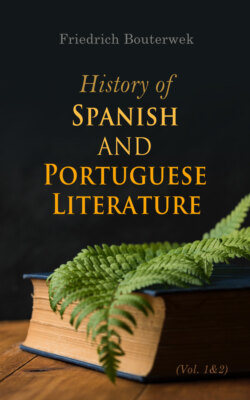Читать книгу History of Spanish and Portuguese Literature (Vol. 1&2) - Friedrich Bouterwek - Страница 24
На сайте Литреса книга снята с продажи.
PEREZ DE GUZMAN, RODRIGUEZ DEL PADRON, AND OTHER SPANISH LYRIC POETS OF THE AGE OF JOHN II.
ОглавлениеTable of Contents
Fernan Perez de Guzman was held in no trifling consideration at the court of John II. His family, which was one of the most distinguished in Castile, was related to all the other great families in the country. As a poet, he studied to combine the peculiar tone of moral and spiritual poetry with that of the old romances. His Representation of the Four Cardinal Virtues, dedicated to the Marquis of Santillana, which consists of sixty-four strophes or couplets, is versified in redondillas, as are also his Ave Maria, his Paternoster, and his other spiritual songs.
Rodriguez del Padron seems likewise to have been held in some esteem at the court of John II. His family name is not known, and as little are the dates of his birth and death, but he is named after the place of his nativity, the little town El Padron in Galicia. It is remarkable that in his poetry he dropped his Galician idiom and adopted the Castilian. Besides the reputation he obtained by his poetic productions, which are chiefly love songs, he is celebrated for his friendship with the Galician poet Macias, who will be further mentioned in the history of Portuguese poetry. The tragical death of Macias, who fell a sacrifice to his romantic susceptibility, made such an impression on Rodriguez del Padron, that he shut himself up in a Dominican cloister, which he had erected at his own expense. He became a monk, and terminated his life in that convent.
Alonzo de Santa Maria, called also Alonzo de Cartagena, wrote love songs, probably in his youth, and then devoted himself to spiritual affairs. He died Archbishop of Burgos, in the year 1456.
Several other poets whose works fill the Cancionero general, also lived in the reign, or rather under the anticipated domination of queen Isabella, who, in the year 1465, vouchsafed to her almost dethroned brother, Henry IV. the little authority, which, as a nominal king he retained till his death in 1474. At this troubled period Garci Sanchez de Badajoz sang his passionate and glowing songs of love; and at the same time flourished the two Manriques, Gomez Manrique and Jorge Manrique; the latter was nephew to the former. Both owed the consideration they enjoyed no less to their poetical works than to their high and pure Castilian descent. The Bachelor de la Torre, of whom nothing further is known than what his own songs express, lived at the same period.
